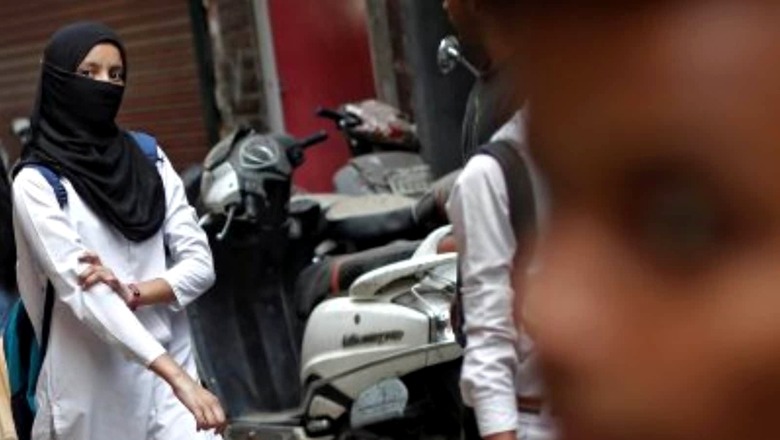
views
The Karnataka High Court on Tuesday finally delivered its verdict on the hijab controversy that stoked weeks of protests and led the authorities to close schools across the state, while also spilling over to other parts of the country. Upholding the ban, the court stated that wearing hijab is not essential religious practice of Islamic faith.
Over eleven days, a full bench consisting of Justices Ritu Raj Awasthi, JM Khazi and Krishna S Dixit heard a batch of pleas by students from Udupi and Kundapura, stating they should be allowed to wear hijab (a Muslim headscarf) while attending class.
On February 16, the Karnataka government issued a circular quoting the High Court’s interim order that directed all schools and colleges under the minority welfare department not to allow hijabs, saffron stoles and scarves in classrooms.
According to the state government, students should follow the uniform code set by their institutions and that the hijab was “not an essential religious practice”.
The court reserved its judgement on February 25.
What was the row about
The hijab controversy erupted in late December last year when six Muslim students were barred from attending classes wearing the headscarf. The girls, who studied at the Udupi Government Pre-university College, were told that a policy was in place which banned them from wearing any clothing that was not part of the uniform.
The girls protested, saying they were not being allowed to attend classes since mid-December.
Udupi BJP MLA Raghupati Bhat, also the college’s development committee head, met with the students and parents and requested them to follow the college dress code/information that is prescribed. In protest, the six girls at first stood outside the classroom for three days, and later they approached the courts.
Hijab-wearing students file petitions in court
On January 31, several writ petitions were filed in the Karnataka High Court by Muslim students who sought the right to wear hijab in classrooms under Articles 14, 19 and 25 of the Constitution of India. In their petition, they contended that wearing hijab is a fundamental right and that the Constitution granted the freedom to profess, practise and propagate any religion.
The issue snowballed and protests were held across the state — by those supporting the hijab and counterdemonstrations by youth wearing saffron scarves demanding the girls fall in line.
Several colleges in Vijayapura, Koppa, Mangaluru, Kundapura and Udupi were hit by the controversy and classes were suspended to ensure the safety of other students.
Videos of protests surface
While several videos began to emerge of girls wearing hijab claiming it to be their religious right, the issue began to gain communal colour even as the debate entered the courts.
Students from a government college in Chikkamagaluru’s Koppa protested by wearing saffron scarves and said these should be allowed if hijabs are permitted.
Over the next few days, videos of students wearing saffron scarves and hijab being stopped at the gates of institutions emerged.
In Chikkamagaluru, a stand-off between students supporting hijab-clad girls who wore blue shawls and those against wearing saffron was seen.
A video from Mandya, showing a burka-clad student shouting out “Allahu Akbar” after allegedly being heckled by saffron-wearing youngsters near her college, went viral.
Udupi college principal alleged students being instigated
According to Rudre Gowda, the principal of the Udupi college, students who earlier used to wear hijab would do so until they entered the campus and would take it off before entering their classrooms.
“In the last 35 years, we have not had a single issue regarding the wearing of hijab. No girl would wear it inside the classroom. These six girls have been instigated by some outside forces and were asked not to budge from their stand. I want to ensure uniformity in classrooms, that’s all,” Gowda told News18 over the phone when asked about the issue.
“We were to attend classes as we had been away from college for months due to the Covid pandemic. When we got back, they did not allow us inside,” said the girls to this reporter. They also complained that the college did not allow them to speak in Urdu, Arabic or Beary (a language of Dakshina Kannada).
Karnataka High Court’s interim order
The court heard the case for the first time on February 8 and an interim order was issued, which stated that “pending consideration of all these petitions, we restrain all the students regardless of their religion or faith from wearing saffron shawls (bhagwa), scarfs, hijab, religious flags or the like, within the classroom, until further orders”.
After a marathon hearing of the hijab case starting February 10, the court reserved its judgement on February 25.
Karnataka government’s stand
The Basavaraj Bommai-led BJP government justified its stand against hijab in educational institutions by stating that under the Karnataka Education Act of 1983, it was not allowed. The government argued that under Section 133 of the Act, it reserves the right to issue appropriate directions to schools and colleges to ensure the maintenance of public order.
On January 26, the Karnataka education department decided to form a committee to draft guidelines on uniforms at pre-university (PU) colleges across the state. The PU board requested all colleges to maintain the status quo until the new guidelines were brought to force.
Karnataka’s education minister BC Nagesh explained that all colleges that fall under the purview of the Karnataka Board of Pre-University Education will have to follow the dress code prescribed by the College Development Committee.
“If the administration does not fix a dress code, clothes that do not threaten equality, unity, and public order must be worn,” the government order said.
Read all the Latest News India and Breaking News here



















Comments
0 comment